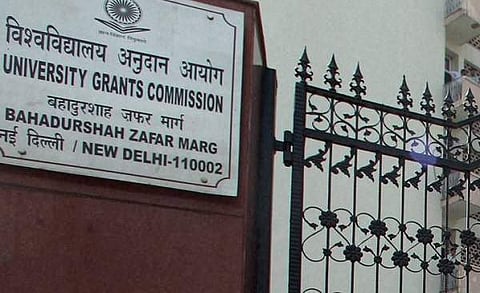

NEW DELHI: The University Grants Commission (UGC) has approved guidelines for institutional leadership development programme for Higher Education Institutions (HEIs) with the aim to encourage institutions to develop tailored leadership programmes that meet local and national challenges, focusing on skill development, strategic visioning, and adaptive leadership.
Speaking with this paper, UGC Chairman Prof. M Jagadesh Kumar said, “In a rapidly evolving higher education landscape, nurturing and promoting leadership within HEIs is essential for navigating the complexities of running HEIs.”
These guidelines, he said, offer a comprehensive framework to develop the next generation of academic leaders.
The guidelines emphasise the importance of both personal and institutional development to foster effective leadership, he added.
In line with India's National Education Policy (NEP) 2020, the guidelines highlight the need to prepare faculty for leadership roles to adapt to new educational structures, such as multidisciplinary approaches, autonomy, and introducing an academic bank of credits.
Believing that leadership must balance administrative responsibilities with encouraging innovation, inclusivity, and industry collaboration, the guidelines encourage institutions to develop tailored leadership programs that meet local and national challenges, focusing on skill development, strategic visioning, and adaptive leadership, he added.
HEI leaders are seen as key in driving learning outcomes based on education, research excellence, managing and raising financial resources, and cultivating an inclusive, forward-thinking academic culture.
"This will serve as a guiding compass for institutions aspiring to empower their faculty members to adeptly assume leadership responsibilities. This comprehensive manual draws from a wealth of collective knowledge, research, and pragmatic insights shared by experienced academic leaders,” the guideline, which was approved in the Commission meeting on October 3, said.
The key areas addressed include the blend of artistry and science in leadership, underscoring the need for mentorship, continuous learning, and a deep understanding of the unique dynamics within each institution.
The guidelines recommend a holistic approach by integrating leadership systems with personal development. This involves succession planning, cohort-based leadership programs, and fostering cross-disciplinary collaboration to build a robust leadership pipeline.
“Ultimately, the objective is to create academic leaders who can steer HEIs toward sustainable growth and future readiness, ensuring their institutions thrive in the modern educational ecosystem,” the guidelines said.
The aim of the intervention to develop leadership should be to create an ecosystem of practicing leadership that prepares the faculty and also trickles down among the students through capacity building on leadership.
The overall objective for this leadership development should be broadened to ensure that the faculty members and non-faculty members are also prepared to play the role of leaders considering the future readiness of the modern workplace.
They should contribute towards the larger goals set out by the higher education ecosystem.
The guidelines stress the requirements for leadership development roles by highlighting that faculty members should be equipped with diversified skill sets such as teachers, researchers, mentors, coaches, and excellent administrators to create holistic institutions.
They should develop entrepreneurial skills to respond to the volatile uncertain complex and ambiguous (VUCA)/brittle, anxious, non-linear, and incomprehensible (BANI) world, take risks, and drive performance excellence to make their institution ‘future ready.’
Cultivate a visionary mindset to gain long-term and sustainable development of the institute by creating robust strategic objectives for self and the entire workforce.
Also, learn contemporary technology and trends to enable the institute to make hybrid and digitalized spaces for learning and research.
They should also share the best practices available nationally and internationally to benchmark themselves and create an implementation plan for their respective institution.
Hone their administrative skills to manage and set up world-class, futuristic systems and processes for the institute; be prepared to deliver on interventions necessitated to prepare a generation of student citizens with a new mindset and not just skill sets that could be socially useful as well as financially rewarding and should be active contributors to the goal of nation-building, and inspire the same spirit among the students
As a part of the capacity building programme for leadership, two modes of training programmes are designed - iGOT (Integrated Government Online Platform) Training Programmes Module and Online Leadership Training Programme Module, it said.